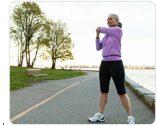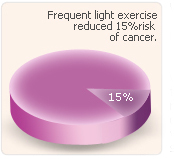
Physical activity is important throughout life to maintain a healthy body and reduce the risk of disease. During menopause it is thought to be particularly important as exercise can reduce the wavering hormone levels which occur as a woman reaches the end of her reproductive life. Until recently research has been ambiguous as to whether breast cancer risk is reduced by exercise during and leading up to menopause. A recent review of menopause research has shone some light on whether physical activity can help in the fight against breast cancer as women age.
With information from Nurses' Health Study, research carried out in 1975 and 1980 assessed women's weekly exercise routines and physical activity. All the women involved were aged between 30 and 55 and over the 16 year follow up, 3137 cases of invasive breast cancer were identified. From this group 1036 cases occurred before menopause and 2101 occurred after menopause.
The results of this study show that those women that participated in over seven hours of physical exercise a week were at a much lower risk of breast cancer than those women who participated in under one hour of physical exercise. Researchers have speculated that this might be due to the reduction in ovarian hormones moving around the body which occurs when a person regularly exercises. A lack of physical activity can encourage such hormones to build up in one area, in some cases in the breasts.

When results were collected in 1975, 1980 and 1994, the amount of physical activity each woman undertook was recorded in different categories in order to determine whether strenuous activity can better dispel the build up of hormones during menopause. Activity could be moderate, strenuous or vigourous and walking was found to be one of the most common forms of moderate exercise for women both pre and post menopause. Vigorous activity was usually in the form of aerobics or cycling. The results of this study found that women who only walked but took this form of exercise frequently were at the same lowered risk of breast cancer as those who took strenuous exercise frequently. Therefore frequent light exercise has the same benefits of more strenuous workouts, a reduced cancer risk of 15%.
Although physical exercise helps to prevent a host of medical conditions as the body ages, as this research demonstrates the risks of breast cancer is only slightly reduced with life-long exercise regime. Women often find that they put on weight during menopause and regular exercise can help to reduce weight and may help to generally ease difficult menopause symptoms. Women going through menopause should consult their doctor in order to discover ways to further reduce their risk of breast cancer as they age.